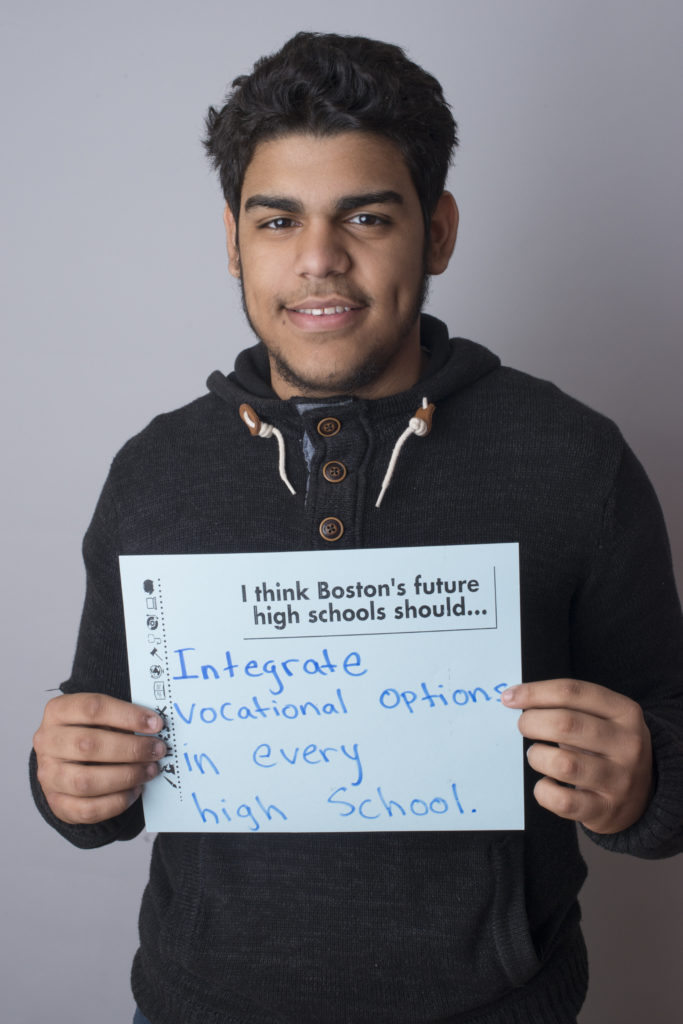
By Marfry E. Cabral G.
Some students dream of finishing high school and going to college to have a successful career and make a lot of money. Others just want to finish high school and start their lives right away. Many people don’t even finish high school and the majority of the time it is because they are no longer engaged in learning and think there’s nothing for them to look forward to in school. In Boston high schools, many students drop out due to boredom and frustration. High schools are not providing enough non-academic career opportunities for students.
I interviewed Nina Culbertson, a Senior Research Associate at the Rennie Center for Education Research and Policy about how to integrate vocational training and other non-academic options in Boston Public Schools.
Marfry: What kind of alternate education techniques could be used to help high school students find their career choices?
Nina: So, I think that there are a lot of opportunities for projects like this. So if you’re talking to people who are not in the school so maybe each semester students could do a project where they’re working with someone in a field that they’re interested in. Even if they’re not working with them, just talking to them about they’re interest in, there are also a lot of opportunities for earning credit for things that happen outside of school. You can take arts classes at different schools like at the Institute for Contemporary Art and that’s really cool people the people that teach you there are teaching real life things that you’d be using like photo or video production so getting credit for doing things that you’re really interested in is a big piece of that.
Some schools do that in a different way. At Boston Day and Evening Academy, you can work in a nursing type role at one of the hospitals and get credit for that and mix it with what you’re doing in the classrooms. There’s also the idea of service learning – so if you get credit for it, but say you do a project about something that you’re really interested in and then you go volunteer your time to work at a nursing home or the department of public works if you’re interested in landscaping. You can do that a couple hours a week
Some people I know are trying to get other ideas off the ground in Boston: the idea that you can get “credit” for skills developed in an internship or training program. and it won’t be school credit, but it would be like life credit. This is called badging: you could earn badges that you could put on work applications and college applications. Let’s say you went and did some work with an organization, like La Sociedad Latina, and you developed all these skills, like you were a project manager and you did some organizing for some cause, you would get those badges and you could put those on your application to your employer. That’s an idea that’s becoming big now.
Marfry: Do you think that students graduate and don’t go to college is because they don’t feel prepared or that they don’t know what they want to study or be in life?
Nina: Going to college and not knowing what you want to do can be very expensive. It doesn’t necessarily prepare you for work either.
High school is meant to prepare you for the world after high school so if you decide not to go to college you should still be able to get a good job so these experiences that you’re talking about you should be getting because if you don’t go to college, it’s fine. I mean most people don’t go to college. Gaining skills through internships and work experience is really important so you can graduate and make money and figure out what you’re going to do.
Marfry: What is your opinion about vocational high schools?
Nina: I think that across Massachusetts the vocational schools are really good, a lot of them are at least. But the key to making vocational schools really good is having a lot of partnerships with businesses and having those businesses invest in the schools so they can have good lab space and materials so they have good teachers who have worked in that field. So if you are in a mechanics class about repairing cars, you should have someone who has done that who can teach it to you. If you are in a business class or entrepreneurship class or engineering class, you should have people who know that skill really well so they can teach you and prepare you for going back and doing that.
You must be logged in to post a comment.